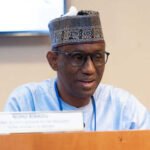There are palpable concerns over the likely economic impact of the planned removal of fuel subsidy in Nigeria.
Development Diaries reports that the Nigerian government announced in 2022 its plan to remove the subsidy by June 2023, with President Muhammadu Buhari placing the responsibility on the Bola Tinubu-led incoming administration.
The government has also announced it has secured a World Bank loan of U.S.$800 million to provide post-petroleum subsidy palliatives for over 50 million Nigerians.
But what do Nigerians, especially those in rural areas, understand by the subsidy and the move to discontinue it?
Wumba is a small community in the Lokogoma area of the Federal Capital Territory (FCT), Abuja.
What defines the community is its untarred road filled with brownish sand, small kiosks located at every corner on each side of the road, tiny tired-looking houses and electricity cables crisscrossing above the houses.
Tina Agbo is a tailor and resident of this community. Under a dazzling noontime sun, she focused on her work, putting together pieces of fabric to achieve perfection while she worked her legs on the pedals of her sewing machine.
‘I used to hear it in the news that they want to remove fuel subsidy, but I don’t know what they want to remove’, Agbo, who let out a hearty laugh, told our visiting reporter.
‘They’re supposed to bring down the price of the fuel but they are taking it up all the time. That’s what I know about it, I don’t know any other thing about it’.
For Uju Eke, a point of sale (POS) operator in Wumba, she also seemed oblivious to the government’s planned subsidy removal.
‘What I understand is that the government wants to remove the high cost of fuel or something like that’, Eke said.
Another resident, Mark Collins, who is a businessman, seemed less concerned about the subsidy matter.
With his eyes fixated on his phone and his fingers pressing away, Collins said, ‘I don’t know anything about government subsidy removal and I am not interested. Government should do whatever they like’.
As for Joy Michael, a cheerful hairdresser, she said, ‘I have not heard about the removal of fuel subsidy. We don’t know anything like that’.
However, another POS operator in the community, Joy Isi, had some concerns about the planned subsidy removal.
‘I would advise the government not to remove the subsidy because, even now, we are dying of hunger, [let alone] if they remove the subsidy’, she said.
Sunday Agor, who installs satellite dishes for customers, sat down outside his shop, gazing into the busy street ahead of him.
He had this to say, ‘Yes I am aware that they want to remove the fuel subsidy, but the implication is that if they remove the fuel subsidy, the common man will suffer in terms of transport, food; everything will go up’.
Fuel prices
The current official price of Premium Motor Spirit (PMS), popularly called petrol, in Nigeria is N185. However, the average cost per litre goes between N185 and N270 based on current market data.
According to oil marketers, the average cost of petrol could rise to about N700 per litre from July, should the federal government stops subsidy on PMS in June.
A 2022 report by the National Bureau of Statistics (NBS) revealed that an estimated 133 million Nigerians are multidimensionally poor; and in March 2023, the Food and Agriculture Organisation (FAO) projected that about 25.3 million people in Nigeria would face acute food insecurity during the June to August 2023 lean season.
The prevailing situation and indices in the country suggest that millions of Nigerians would sink further into poverty when subsidy is removed.
Cost of living concerns
Speaking to Development Diaries on this issue, the Executive Director of Nigeria Network of NGOs (NNNGO), Oluseyi Oyebisi, said the removal of subsidy would deepen the poverty level in the country.
‘We are already in a triple crisis because of the fallout of the Covid-19 pandemic. However, before Covid-19 even came, we were already in crisis – the economy wasn’t doing well, we have had a lot of development indices that we have not been able to meet. So this is our normal before we got to the situation that we are in now’.

He added, ‘So the removal of subsidy would mean that poverty would deepen, we would have more people who won’t afford basic amenities in life, we already have the cost of living crisis that’s up, there’s food inflation, we would witness more of these things when the subsidy is removed’.
An economist, Paul Alaje, in an interview with Arise News, advised the government on the best measures to implement before the removal of the subsidy.
‘Let at least four refineries – the private refinery we have always spoken about, and three other refineries out of four – be functional so that we don’t keep the destiny of a nation in the board of directors of one company’, he advised.
$800 million loan for palliatives
There is little or no assurance that the borrowed $800 million would be properly utilised to get the poor out of poverty nor alleviate the effects of the removal of the subsidy.
’50 million Nigerians are being targeted. Recall that the population of those that are poor in the country is 133 million going by the NBS statistics, so if 50 million are being targeted, it shows that we still have a fallout of 83 million’, Oyebisi said.
‘But the target would be to the poorest of the poor, and if you’re targeting the poorest of the poor, I’ll think they’ll be using the social register which government claims they have worked on and they have used that to identify the poorest of the poor.
‘I do think that some civil society organisations are monitoring the social register disbursement of support to the poorest of the poor, so we would rely so much on them and others that are interested in monitoring that to ensure that the support goes to those that really need it, and that would help cushion the effect as it were’.
There are certain policies and activities expected from the government towards preparing citizens on what to expect post-subsidy removal.
The NNNGO boss had more to say on this.
‘I think if the government is able to manage the fallout of this subsidy removal, that would earn them some level of trust’, he added.
‘It’s a tough call when you and I play with the numbers – $800 million for 50 million people, for how long? We still have 133 million people that are poor, we still have an economy that is not isolated from all the economic woes that we are seeing globally, and the cost of living prices is also there, so I do not see any magic.
‘But if the government is able to maybe widen the tax net, they’re able to plug illicit financial flows and also tackle corruption and get the civil service to work effectively such that services that are delivered by government are delivered effectively, properly and on time, then we begin to see some level of changes.
‘At the end of the day, there has to be very robust citizens’ communication, where the National Orientation Agency (NOA) comes in to educate citizens on government policies, the implications and all that’.
Development Diaries calls on the NOA, in collaboration with the country’s ministries of finance and petroleum resources, to commence grassroots sensitisation to the planned subsidy removal, its potential impact on the livelihoods of Nigerians, and the government’s plan to mitigate its effect.
Photo source: Rama




